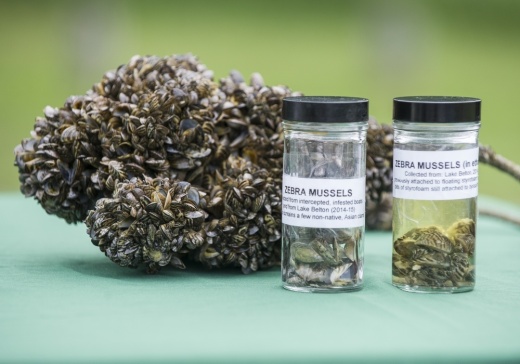Memorial Day weekend marks the unofficial start of boating season in Texas, and the Texas Parks & Wildlife Department is urging boaters to take necessary precautions against invasive species, according to a May 26 TPWD news release.
Species such as zebra mussels and giant salvinia—a highly invasive aquatic plant—pose an ecological threat to Texas lakes and waterways.
“While we want everyone to have a great time, we also want them to avoid giving free rides to invasive species and helping them travel to new lakes,” Brain Van Zee, Inland Fisheries Regional Director, said in the release.
Zebra mussels can attach to anchors, and microscopic larvae can be transported in residual water within a boat, according to Monica McGarrity, Senior Scientist for Aquatic Invasive Species Management.
The most effective way to prevent the spread of invasive species such as zebra mussels is to clean, drain and dry boats and boating equipment, according to Van Zee. These practices are required under Texas boating regulations and boaters could face a $500 fine as a result of transporting prohibited invasive species.
Only a small fragment of an invasive species can pose a threat to Texas lakes, and the management of an invasive species can be costly once a waterway is infested. In the Greater Austin area, Lake Travis and Lake Austin have been infested with zebra mussels since initial detection in 2017 and have required significant treatment efforts since, according to Austin Water, the city’s water utility operator.
The non-native shellfish attach to hard surfaces and pose a number of ecological and recreational threats. Zebra mussels can damage boats and water supply infrastructure, alter aquatic ecosystems, cause harm to native species and litter shorelines with sharp shells, according to TPWD.
In the past year, species including the zebra mussels and giant salvinia have spread to new water bodies. However, other harmful aquatic plant species such as water hyacinth and hydrilla have also been introduced to Texas lakes by both in-state and out-of-state boaters.
In an effort to combat this threat, boaters should drain all water on-board prior to leaving the lake and should remove all plants, mud and debris from their boats, trailers and gear. Additionally, TPWD urges boaters to fully dry their watercraft for at least one week prior to visiting another lake.
“If you have stored your boat in the water at a lake with zebra mussels, it is likely infested with zebra mussels and poses an extremely high risk for moving this invasive species to a new lake,” TWPD stated.
To learn more about how to protect Texas lakes against invasive species, boaters and lake goers can visit TPWD’s online resource.





